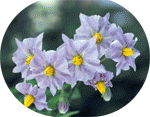| Abstract Detail
Conference Wide Asprelli, Pablo Diego [1], Occhiuto, Patricia Noemí [1], Makuch, María Argentina [2], Peralta, Iris Edith [3]. Recuperation of pepper, potato and tomato landraces of Andean valleys of Argentina. THE rich cultural heritage of Andean communities comprises the diversity of their agricultural resources, crop practices and food traditions. Small farmers of Argentinean Andean valleys have been domesticating and maintaining landraces of vegetable crops adapted to local environment conditions. These landraces are important food supplies and also constitute valuable genetic resources. However, cultural, economic and environmental factors are threatened their local conservation in home farms. Our aim is to rescue these germplasm, and provide genetic and horticultural characterizations for conservation and potential use in plant breeding programs. Nine itineraries covering Cuyo and Northwestern areas of Argentina have been proposed based on cultural, economic and environmental data. Between March and June 2005 representative landrace samples were obtained from personal interviews with farmers, who also provide information about crop management and seed preservation. A total of 560 accessions representing 46 cultivated species were collected. Solanaceae crops represent 22,5% of the total collection: pepper 7,5%, potato 10% and tomato 5%. A geometric curve explains the diversity of landraces found along a latitudinal and altitudinal gradient, showing that few species predominate in each sampled area. Landraces diversity is mainly affected by social traditions, distance from urban areas, crop practices and enviromental factors. Collected landrace accessions are preserved in the Vegetable Crop Germplasm Bank of the National Institute of Technological Agriculture, located in La Consulta Experiment Station, Mendoza. Field studies are currently developed to characterize these valuable resources, understand patterns of diversity, and incorporate them in breeding programs.
Log in to add this item to your schedule
1 - National University of Cuyo, Agronomy, Almirante Brown 500, Chacras de Coria, Luján de Cuyo, Mendoza, M5528AHB, Argentina
2 - National Institute of Technological Agriculture, Seed Laboratory, Mail box 8, Ruta 40 s/n, La Consulta, Mendoza, 5567, Argentina
3 - National University of Cuyo and CONICET, Agronomy, Almirante Brown 500, Chacras de Coria, Luján de Cuyo, Mendoza, M5528AHB, Argentina
Keywords:
Pepper
Potato
tomato
Andean landraces recuperation
Argentina.
Session: Poster-127
Location: Ballroom CD/Monona Terrace
Date: Tuesday, July 25th, 2006
Time: 8:00 AM
Abstract ID:275 |
